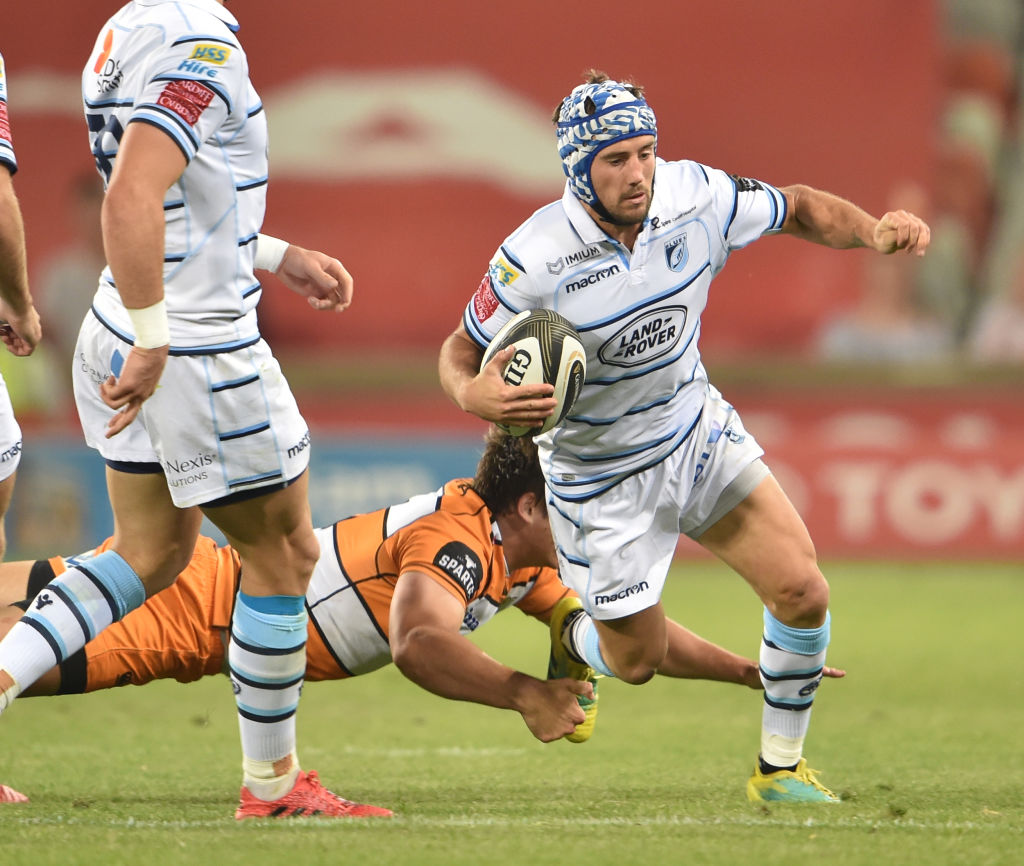Jackson column: New chance for Welsh clubs to join British League

BLOEMFONTEIN, SOUTH AFRICA - OCTOBER 27: Matthew Morgan of Cardiff Blues during the Guinness Pro14 match between Toyota Cheetahs and Cardiff Blues at Toyota Stadium on October 27, 2018 in Bloemfontein, South Africa. (Photo by Johan Pretorius/Gallo Images/Getty Images)
Of all the lamentable decisions taken since professionalism, the one lamented in Wales more than any other revolves around the abolition of the Anglo-Welsh League.
Even now, more than 20 years after the event, it is still a bone of contention, especially on the west bank of the Severn. There, amid dwindling crowds for the PRO14, the older rugby public yearn for the restoration of the old cross-border conflict.
It would have happened way back during the spring of 1998 in Worcester, a city famous for its cathedral, its cricket and its sauce, ironically so in view of what transpired. The RFU offered room for five Welsh clubs in the English League, a move made not for altruistic reasons but to give their competition an injection of fizz.
Far from agreeing, the WRU demanded nine places, in other words that the entire Welsh Premiership was moved lock, stock and barrel into the putative Anglo-Welsh, including the newly-promoted Caerphilly. The RFU viewed their neighbours’ reaction as too saucy by far and abandoned the project.
“We had picked our five clubs,” a prominent Welsh official told me yesterday. “Cardiff, Swansea, Llanelli, Newport and Pontypridd were all ready to go. And look what we’ve been through ever since.”
Instead of Bath, Bristol, Gloucester, Leicester and so on, the Welsh clubs found themselves marooned in a makeshift Welsh-Scottish League, the forerunner of the Celtic League which became the PRO12, then the PRO14.
Two of the five, Cardiff and Swansea, joined the English Premiership for season 1998-99 in defiance of the WRU. They banned the rebels from the Heineken Cup and fined each £150,000.
The pair had presented proposals for a British League. They returned to the fold on condition that they would be allowed to compete in the English Premiership ‘in the event of a British League’.
And who was among those in the vanguard for such a competition? Gareth Davies, then chief executive of Cardiff, now chairman of the WRU. Now with new commercial forces reviving a British-Irish League, the horse that bolted before the end of the last century seems to be heading back to the stable.
As RFU chairman at the time, Brian Baister remembers it well. “We thought we had a deal,” he says. “Our plan was to have up to 14 English clubs, five from Wales, two from Scotland and the four Irish provinces with promotion and relegation.
“Then the late Tom Walkinshaw (as chairman of Premier Rugby) got rid of two of the English clubs (Richmond and London Scottish) so we were down to 12. Having failed to agree a number with Wales, the Irish then came back to the table and said they wanted nothing to do with it. They thought England would take over the whole thing.
“You have to remember the times as they were then (England had been kicked out of the Five Nations by the Celtic countries for breaking away from the collective bargaining and doing their own television deal). It was a case of mistrust and there was plenty of it around at the time.”
If it takes off, Wales will be guaranteed to have all their teams involved, four instead of nine.
They came from near and far to a 12th century church in the heart of England last week to pay tribute to the ‘greatest of all Leicester Tigers’, the incomparable David Matthews. How great could be gauged from the sight of almost a complete pack of England captains filing into St Nicholas’ in the Rutland village of Cottesmore.
There were seven in all with Budge Rogers, who had turned 80 barely a fortnight earlier, heading the list in terms of seniority, albeit as the odd man out from Bedford.
The other six earned the right to wear the national armband as Tigers – Peter Wheeler, Paul Dodge, Martin Johnson, Neil Back, Martin Corry and Lewis Moody. They turned out in honour of the local farmer who outplayed them all only to finish as he started, uncapped.
In the modern game with its 23-man match squads, Matthews would have had a stack of them. Instead he gave everything to the Tigers from 18 to his passing last month at 82.
During the intervening 64 years he served the club as player, captain, coach, director and president. From 1955 until his retirement in 1974, he made 502 first-team appearances, a figure which will never be threatened.
Not for nothing did Tigers’ chairman Peter Tom acclaim him as ‘the life and soul of the Tigers’. The former players in the congregation reflected his enduring appeal, from old-timers like Bob Rowell, Kevin Andrews and Gary Adey to those who followed, from Darren ‘Dazza’ Garforth to Geordan Murphy, Tom Youngs to Toby Flood.
Dean Richards delivered the eulogy, emphasising the qualities that made his mentor the selfless team player.
“Whatever he did, he had no thought of gaining applause,” Richards said. “He just went about it and did it for the benefit of others which spoke volumes about him.”
Back in the day when Welford Road used to be the centre of the club rugby universe, each and every visit offered the priceless chance of an after-match drink in the Tiger Bar listening to David Matthews’ enlightening words of wisdom about every aspect of the game.
If rugby truly is the game they play in heaven, David Matthews will be in his element.